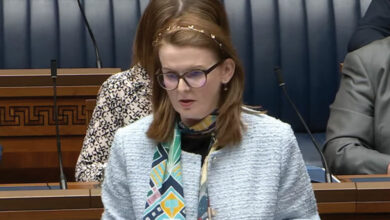A sustainable footing

Newly appointed Chief Executive of the Northern Ireland Local Government Association (NILGA), Alison Allen, talks to David Whelan about the importance of a sustainable footing for local government, delivering a coherent voice, and the opportunity for economic growth.
As the arm of government closest to communities, local government was praised for its agility and flexibility in responding to the pandemic, but fresh financial challenges pose risks to future service delivery.
The sector has faced unique challenges, not least a major drop off in its revenue streams as services were forced to close during successive lockdowns and rate reliefs were rolled out to protect local businesses and the economy. However, the nature of the pandemic also shone a spotlight on the importance of the vital services delivered by local government, ranging from waste management through to leisure provision and local placemaking.
Collaboration between regional and local government and the third sector during the pandemic was critical for a successful response and it was hoped that increased awareness of the role local government plays would be a foundation of efforts for recovery and growth. However, economic and political instability means that the sector now faces fresh financial challenges in delivering vital services to communities.
The Northern Ireland Local Government Association (NILGA) is the council-led representative body for local authorities in Northern Ireland. NILGA’s membership is drawn from each of the 11 councils, while working in partnership with other key regional bodies and stakeholders.
The association supports and represents Northern Ireland’s local government’s interests on regional bodies, within the UK Forum of Local Government Associations in the UK, the Republic of Ireland, and in Europe.
Alison Allen took up post as Chief Executive of the representative body for local authorities in Northern Ireland in February 2022, bringing with her over 20 years of public service experience, and immediately embarked on a process of engagement with each of the 11 councils to establish their priorities and identify those issues of common ground.
Allen believes now more than ever, as public finances come under increased pressure, that a strong and coherent voice and the building of a strong lobby for members is critically important.
“Our councils are sovereign entities, making decisions on local priorities but there are also many areas of common ground at a regional level. Councils provide some of the most important public services but local government only represents about 5 per cent of the public purse. So, when trying to prioritise the interests of residents and influence the rest of the public sector, it is important that we come together in our asks.”
On why ensuring the voice of local government is fully heard is a priority, Allen points to the agility and flexibility shown during the pandemic, where, as the arm of government closest to the resident, local councils had the greatest insight into the needs of communities and were able to quickly mobilise staff in response to emerging priorities. The Chief Executive highlights the effective collaboration taking place daily between residents, elected representatives, and council officials, enabling the delivery of quick, needs-based solutions.
“Councils provide some of the most important public services but local government only represents about 5 per cent of the public purse.”
Enhanced confidence in local councils’ capacity to deliver effective services which best meet the needs of local council areas is one of the positive legacies of the pandemic, attests Allen. Pivoting quickly and dynamic planning after the initial disruption saw a real focus on the importance of delivering core services, which Allen explains was enabled by the high levels of accountability and democratic oversight which exist in local government relationships.
Like much of the public sector, the pandemic has accelerated the appetite for digital transformation and the opportunities for more collaboration across the 11 councils, however, public finance pressures pose challenges to such progress.
Economic threat
Allen explains that “it is a very difficult time because we have shifted from a pandemic to an economic crisis”.
“At a regional level, this financial year (2022/23) alone there is a gap of £90 million of uncontrollable costs in the sector, which, when councils set their budget last year, were completely unknown.”
She adds: “Across the public sector, when facing a crisis, there is always a risk that you become introspective and focus only on your core services. That tendency makes the realisation of our ambitions more challenging, however, councils are determined to continue to be outward looking and focused on growth.”
Allen describes a “cliff edge” scenario in relation to local government finances. Political instability at Stormont has not helped. Although councils raise over 80 per cent of their revenue through rates, they do receive some income for services and also central government grants for specific pieces of work. One example is the Rates Support Grant, provided to seven of the 11 councils which provides extra financial resources for those councils whose needs exceed their rates bases. That funding is not part of a recurring budget, rather, requiring the Department for Communities to bid annually to the Executive. The continuing absence of the Northern Ireland Executive means that at the end of October 2022, councils had not got the 2022/23 rates grant confirmed. “In the current financial context, there is a concern that even if that grant was to be confirmed, it would be reduced. As councils have already set their rates and budget for the financial year, any reduction would cause more difficulties in an already very difficult financial climate,” Allen asserts.
Combined with a potential shortfall in financial support from the Department, councils face a range of additional financial pressures emanating from payroll pressures, increases in utiliy/fuel costs, supply chain issues, cost of raw materials, waste contracts, capital project costs, and inflationary pressures. The impact of inflation on interest rate rises will also see local government’s borrowing cost more, and ultimately, as Allen explains, the ability of councils to invest will be impacted.
“At a regional level, this financial year (2022/23) alone there is a gap of £90 million of uncontrollable costs in the sector, which, when councils set their budget last year, were completely unknown.”
NILGA, with the weight of all 11 councils, have called on government at a regional and national level for support, as was deployed during the pandemic.
“Councillors are in the process of setting the rates for 2023/24 and, without additional support, are faced with some of the most difficult decisions they will have faced in recent decades around passing on those costs to the resident through significant rate increases, during a cost-of-living crisis, or by cutting important public services.
“We are lobbying hard and have taken our case directly to the political parties, increasing awareness that budgetary gaps will impact on some of the basic, critical services delivered by local government to the public. Without financial support, councils will have to significantly reduce discretionary spend, but more importantly some of councils’ statutory services may have to be stripped back. That is not a position that we want to be in as a sector.”
Opportunity
Calls for councils to be put on a more financially sustainable footing in the short term are underpinned by a longer-term ambition to see a substantial review of how councils in Northern Ireland are funded. Allen highlights that one of NILGA’s priorities is securing buy-in for a “systematic review of how local government is financed”, stressing that an annual budgeting cycle poses a challenge to long-term planning.
The Chief Executive says that sustainable financing would enable a consistency of service levels across all local authorities. However, she believes that the greatest prize would come in the form of councils excelling in their role as placemakers; planning and investing on a long-term basis.
“While the past two years have been an immense challenge for the public sector and have put a serious strain on our councils, they have also served to highlight the huge value local government brings to Northern Ireland,” she says.
Local government’s response to the pandemic reinforced long-standing calls for the transfer of regeneration powers, which Allen describes as “the missing piece of the jigsaw”. The reform of local government in Northern Ireland had initially proposed the devolution of powers to regenerate towns and cities across Northern Ireland to local authorities, but a late decision was taken to retain such powers centrally.
Having continued to lobby for regeneration powers to be transferred since that late decision (2016), Allen says that local government is pleased that former Minister for Communities, Deirdre Hargey MLA, had directed her officials to work with local government in exploring this transfer again, although cross-party political agreement will be required for implementation.
“Local government proved itself and its worth during the pandemic, as well as when the Assembly was absent for three years prior to Covid. Our councils know their areas better than any other institutions. They know what works for their communities, what they need more of, what they need less of and have the partnerships in place to ensure citizens get the public services they deserve. Even more local decision making, and local policy development does not just make sense; it is necessary if we are to create a more sustainable Northern Ireland, one which aims to deal with the economic, social, and environmental challenges before us,” she says.
Asked whether recent criticism of the local planning system, a power that was transferred to councils in 2015, might hinder further devolution of powers, Allen says: “Recent reports by the Audit Office and the Public Accounts Committee on the planning function highlighted a number of issues and set out recommendations for improvement. Much of those recommendations centred on how power was transferred and the current balance between central and local government and the systemic issues that exist, including the multiple actors involved.
“There are areas for improvement and, as a sector, we are committed to playing our part in that. NILGA is working with all 11 councils and central government in
bringing forward an action plan to address those systemic issues.”
Elected member development
As well as delivering a coherent voice for the sector, another critical role delivered by NILGA is delivery of the regional Elected Member Development Charter, a training framework designed to support elected members with enhanced capacity for their roles and responsibilities.
Allen explains that a huge number of elected members have utilised NILGA’s training and support programmes and, with political parties recognising the capacity for local government to develop individuals’ skills and competence, the service boasts past participants which range from MLAs to MPs and party leaders.
With fresh local government elections scheduled for May 2023, Allen explains that NILGA are already progressing plans for the new mandate, with a review currently underway of the programme for elected member development, to ensure that skills, capacity and knowledge-based training are relevant and fit for the future.
As NILGA’s membership is based on party make-up, May’s election will see the organisation re-constituted. Allen explains that work is already underway on the development of a new corporate plan, including regional local government priorities for the next four years.
Concluding with her short and long-term ambitions for the new mandate, Allen summarises that the short-term ambition is to see councils financially stable, in order to continue providing the necessary services for communities.
“We are saying we are committed, as a public sector family, to reduce inequalities. However, the longer-term implications of a reduction in critical services delivered by councils is an increase in the inequality gap.”
Additionally, NILGA hopes that any future Programme for Government is a programme for all government, with local government recognised as a partner and not a stakeholder in public service delivery.
“In the longer term, NILGA and our members want to see the transfer of regeneration powers achieved. We will be using our relationships with central government and political parties to continue making the case, in the knowledge that regeneration is the missing piece of the package for delivery for communities.”
| Profile: Alison Allen Before taking up the role as NILGA Chief Executive on 1 February 2022, Allen’s over 20 year public service experience spanned roles in Antrim Borough Council, the Electoral Office for Northern Ireland and the Northern Ireland Assembly. Most recently she worked for Belfast City Council, initially as Safer City Manager and later, as Neighbourhood Services Manager. Allen says that the pandemic saw her recalibrate her work-life balance, with a greater appreciation for time spent with immediate family. To wind down, she enjoys playing the piano and is an avid reader. |






